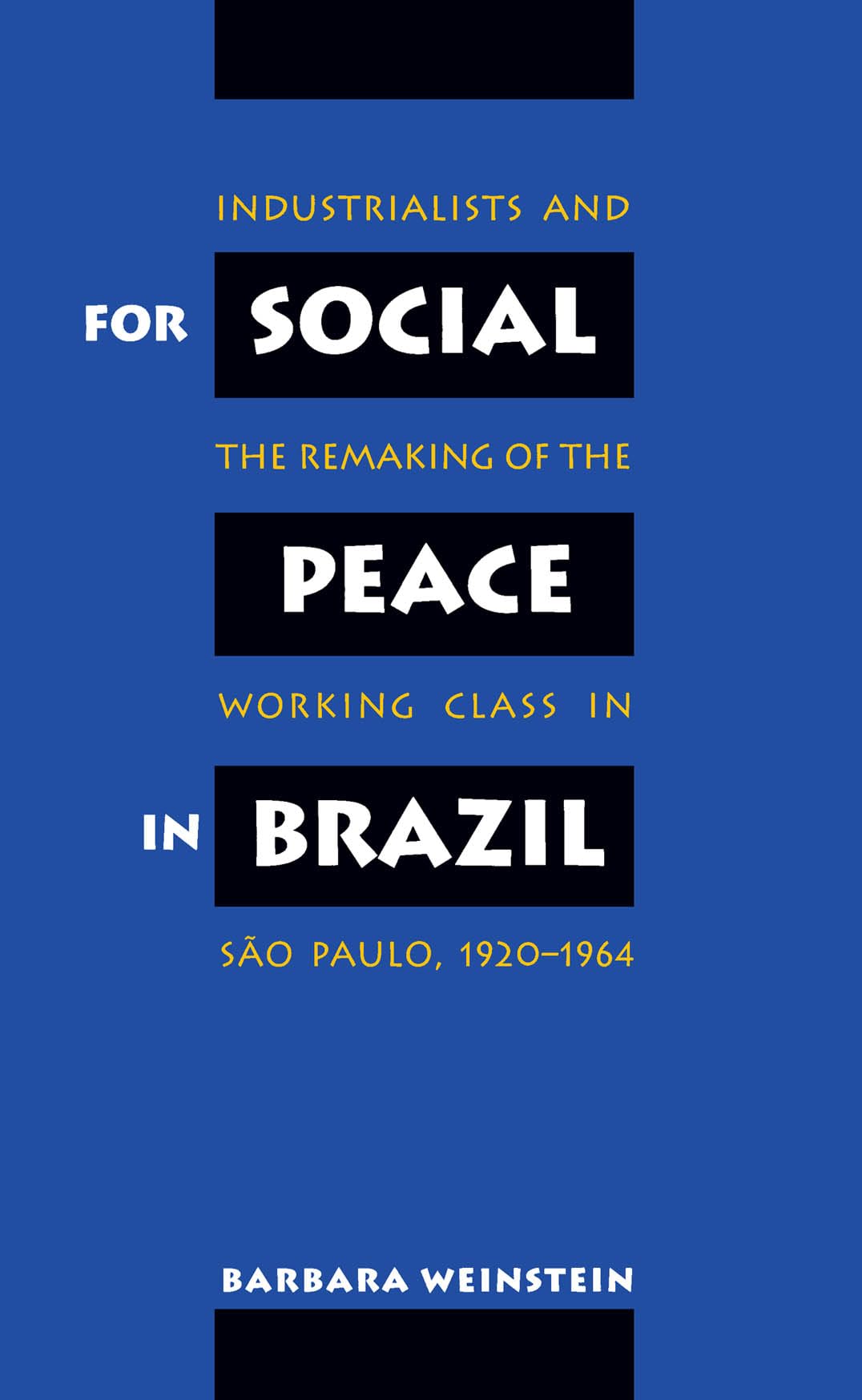
Title

For Social Peace In Brazil: Industrialists And The Remaking Of The Working Class In So Paulo, 19201964,Used
Delivery time: 8-12 business days (International)
This book is the first major study of industrialists and social policy in Latin America. Barbara Weinstein examines the vast array of programs sponsored by a new generation of Brazilian industrialists who sought to impose on the nation their vision of a rational, hierarchical, and efficient society. She explores in detail two national agencies founded in the 1940s (SENAI and SESI) that placed vocational training and social welfare programs directly in the hands of industrialist associations. Assessing the industrialists' motives, Weinstein also discusses how both men and women in Brazil's working class received the agencies' activities. Inspired by the concepts of scientific management, rational organization, and applied psychology, Sao Paulo's industrialists initiated wideranging programs to raise the standard of living, increase productivity, and at the same time secure lasting social peace. According to Weinstein, workers initially embraced many of their efforts but were nonetheless suspicious of employers' motives and questioned their commitment to progressivism. By the 1950s, industrial leaders' notion of the working class as morally defective and their insistence on stemming civil unrest at all costs increasingly diverged from populist politics and led to the industrialists' active support of the 1964 military coup.
By changing our most important processes and
products, we have already made a big leap forward. This ranges from the
increased use of more sustainable fibers to the use of more
environmentally friendly printing processes to the development of
efficient waste management in our value chain.
⚠️ WARNING (California Proposition 65):
This product may contain chemicals known to the State of California to cause cancer, birth defects, or other reproductive harm.
For more information, please visit www.P65Warnings.ca.gov.
Shipping & Returns
Shipping
We ship your order within 2–3 business days for USA deliveries and 5–8 business days for international shipments. Once your package has been dispatched from our warehouse, you'll receive an email confirmation with a tracking number, allowing you to track the status of your delivery.
Returns
To facilitate a smooth return process, a Return Authorization (RA) Number is required for all returns. Returns without a valid RA number will be declined and may incur additional fees. You can request an RA number within 15 days of the original delivery date. For more details, please refer to our Return & Refund Policy page.
Shipping & Returns
Shipping
We ship your order within 2–3 business days for USA deliveries and 5–8 business days for international shipments. Once your package has been dispatched from our warehouse, you'll receive an email confirmation with a tracking number, allowing you to track the status of your delivery.
Returns
To facilitate a smooth return process, a Return Authorization (RA) Number is required for all returns. Returns without a valid RA number will be declined and may incur additional fees. You can request an RA number within 15 days of the original delivery date. For more details, please refer to our Return & Refund Policy page.
Warranty
We provide a 2-year limited warranty, from the date of purchase for all our products.
If you believe you have received a defective product, or are experiencing any problems with your product, please contact us.
This warranty strictly does not cover damages that arose from negligence, misuse, wear and tear, or not in accordance with product instructions (dropping the product, etc.).
Warranty
We provide a 2-year limited warranty, from the date of purchase for all our products.
If you believe you have received a defective product, or are experiencing any problems with your product, please contact us.
This warranty strictly does not cover damages that arose from negligence, misuse, wear and tear, or not in accordance with product instructions (dropping the product, etc.).
Secure Payment
Your payment information is processed securely. We do not store credit card details nor have access to your credit card information.
We accept payments with :
Visa, MasterCard, American Express, Paypal, Shopify Payments, Shop Pay and more.
Secure Payment
Your payment information is processed securely. We do not store credit card details nor have access to your credit card information.
We accept payments with :
Visa, MasterCard, American Express, Paypal, Shopify Payments, Shop Pay and more.
Related Products
You may also like
Frequently Asked Questions
- Q: What is the primary focus of 'For Social Peace in Brazil'? A: The book primarily examines the role of Brazilian industrialists in shaping social policy and the working class in São Paulo between 1920 and 1964.
- Q: Who is the author of this book? A: The author of 'For Social Peace in Brazil' is Barbara Weinstein.
- Q: What are the main themes explored in this book? A: The main themes include industrialists' motives in promoting vocational training and social welfare, the impact of these initiatives on the working class, and the divergence between industrialists' views and populist politics.
- Q: What is the condition of the book? A: The book is listed as a used book in good condition.
- Q: How many pages does 'For Social Peace in Brazil' have? A: The book contains a total of 456 pages.
- Q: What is the binding type of this book? A: The book is available in paperback binding.
- Q: When was 'For Social Peace in Brazil' published? A: The book was published on January 20, 1997.
- Q: What category does this book belong to? A: This book falls under the category of Economic History.
- Q: Is there a focus on any specific agencies in the book? A: Yes, the book explores two national agencies, SENAI and SESI, founded in the 1940s, which were instrumental in providing vocational training and social welfare programs.
- Q: What perspective does Barbara Weinstein offer on the working class? A: Weinstein discusses how the working class, particularly in São Paulo, initially embraced industrialists' efforts for improvement but remained skeptical of their true motives and commitment to progressivism.
